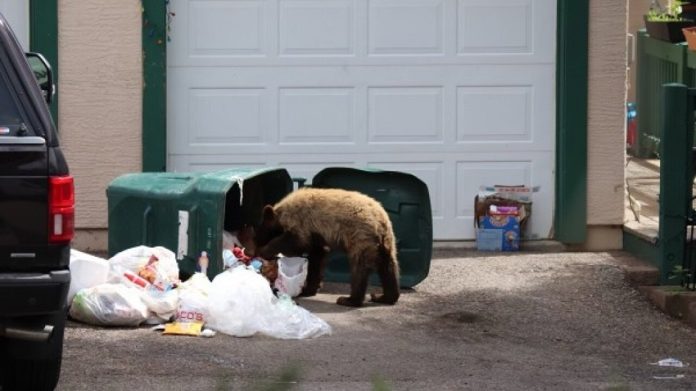Pueblo, CO – In an effort to mitigate the growing human-bear conflict in Colorado, the Human-Bear Conflict Reduction Community Grant Program has awarded approximately $995,000 to 15 projects throughout the state. The funding, which was distributed to a variety of communities and organizations, aims to reduce bear interactions by implementing bear-resistant measures and improving waste management practices.
Among the recipients is the White River National Forest, which received $193,056 for the installation of food lockers at campgrounds. These lockers will help prevent bears from accessing human food, a common trigger for bear conflicts. The Quail Run Homeowners Association in Steamboat Springs was awarded $113,460 for a dumpster enclosure designed to keep bears away from garbage. Similarly, Pitkin Bear Aware was granted $104,500 to install bear-resistant residential trash cans and enclosures, further limiting access to attractants in residential areas.
Other notable recipients include Silverthorne and Frisco, which received $84,400 for bear-resistant trash cans, and the Purgatoire Watershed Partnership, which was awarded $80,000 for improved trash management efforts. These initiatives are part of a broader strategy to protect both bears and people, as local communities increasingly see bear sightings and conflicts.
The National Forest Foundation was allocated $64,504 for food lockers at Dry Lake Campground in Routt County, while Aspen Parks and Open Space received $64,260 for bear-resistant trash cans and fruit tree replacement. Cal-Wood also received funding, $60,000, to create bear-resistant campsites.
Other projects funded include efforts to fortify trash storage in Boulder, provide bear-resistant cans for Eagle County, and implement electric fencing for chicken coops in Jefferson County. The diverse range of projects highlights the collaborative effort needed to reduce conflicts between humans and bears.
“Human-bear conflict measures cannot be successful without collaboration between local communities, wildlife managers, and individuals,” said Travis Long, Grant Manager for Colorado Parks and Wildlife (CPW). “We are excited about this program because interest from the public is high, with many communities taking advantage of the opportunities this funding provides and implementing projects to help reduce conflicts with bears.”
The funding comes at a critical time, as reports of bear conflicts in Colorado have increased sharply. In 2024, CPW received 5,022 reports of bear sightings and conflicts, a nearly 15% rise from the previous five years. According to CPW, about half of these conflicts were linked to trash, while other sources included livestock, chickens, beehives, bird seed, pet food, BBQ grills, and refrigerators. Notably, 2,225 of the reports resulted in property damage.
With these escalating numbers, the Human-Bear Conflict Reduction Community Grant Program aims to provide vital resources for local communities to take proactive steps in preventing future conflicts. By funding projects that fortify trash storage, implement bear-resistant measures, and address attractants, the program hopes to reduce bear-human interactions and ensure both species can coexist safely.
As more communities implement these strategies, the program exemplifies the importance of collaboration and proactive planning in wildlife management. The increase in funding for such initiatives demonstrates a growing recognition of the need to address human-wildlife conflicts head-on, ensuring a safer environment for both people and bears across Colorado.



